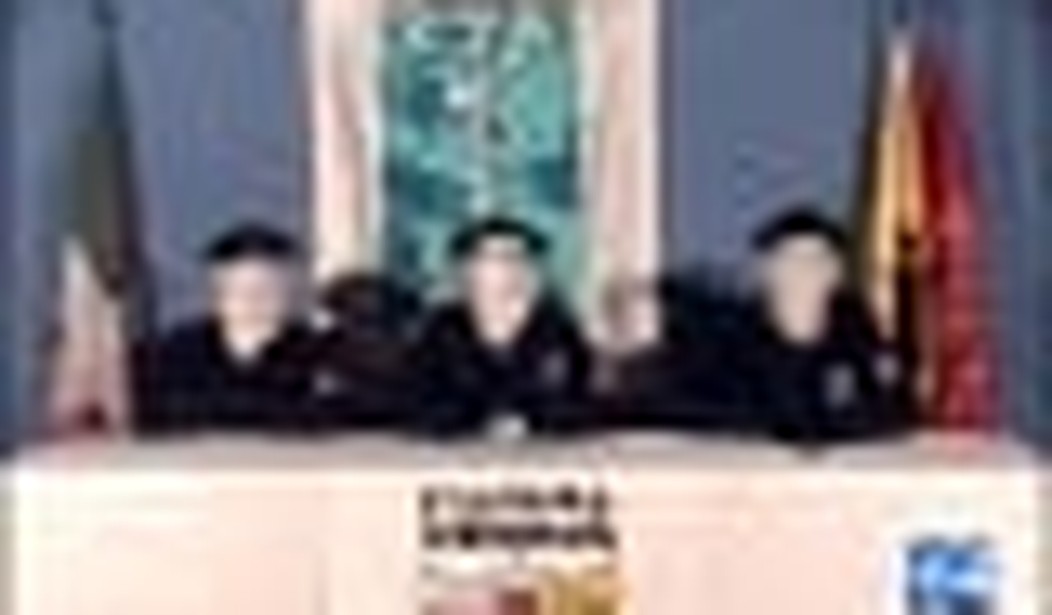Aiding and abetting a terrorist group is a serious crime in Spain, punishable by jail terms of up to ten years. So if it should turn out that the country’s very own interior minister gave terrorists advance notice of an imminent police raid, and later apologized to them for not having aborted it, then it stands to reason that the government — which has since elevated the minister in question to deputy premier and political heir apparent — is in big trouble, and it is time to think about a vote of confidence and have the courts prepare indictments and the media raise all kinds of hell. But will any of that actually happen?
The terrorist group, of course, is ETA, and the incident all Spain refers to as “the big tip-off”occurred back in May 2006, when Premier José Luis Rodriguez Zapatero was desperately eager (as he still is) to reach a deal with the separatist group that has killed over 800 people since 1968 in its bid to set up an independent Basque state in northern Spain and southern France.
The outcome of what the feckless, clueless Zapatero still insists on calling a “peace process” would become apparent half a year after that incident, when the terrorists blew up a parking ramp at Madrid’s Barajas Airport and crushed two people to death. The reason ETA gave for the “accident” — that’s what Zapatero called it — was that the Spanish premier had not kept his promises of political concessions that he repeatedly assured the public he never made.
But before it came to that, Zapatero had offered all sorts of deal sweeteners, good faith gestures, and parity — a democratic government negotiating on equal footing with killers. It was never much of a secret, though it could not be proven and was denied by, among others, Zapatero’s high-profile interior minister, Alfredo Pérez Rubalcaba. But how far Zapatero would go in that direction and how abject he would be did not emerge until just this week
The smoking document is an internal memorandum prepared by and for ETA’s top ringleaders that gives verbatim extracts from talks held with two officials of the Zapatero government in June 2006. It was confiscated by French police in 2008 when they arrested ETA’s chief political strategist and released this week by order of High Court Judge Pedro Ruz, who is investigating the tip-off incident. Its self-evident veracity lies in the fact that it was not leaked or made public or channeled through one or another of the terrorist front groups — it was strictly for eyes-only internal circulation.
Confirmation that ETA had been warned about the raid that took place earlier that same month comes in the form of a groveling apology by one of the government envoys for having allowed it to happen. “This is a serious accident. I don’t know what to tell you — I was really upset when I heard about it and I can understand you guys were too,” he says, using the familiar/friendly form of address. ”They tried everything but they just weren’t able to stop it,” he reassured them.
Then the envoy goes on to admit that a political decision has been made to go easy on terrorists. “We have told the National Police, the Civil Guards, the Ertzaintza (Basque police force), and the French police not to make any arrests and it hasn’t been easy because that kind of order doesn’t get put into writing.” Evidently not. Evidence pieced together by Judge Ruz seems to show that the heads-up was home-delivered to the terror gang.
On May 4, a man since identified as a police inspector, had called on the owner of a sleazy bar in the town of Irun, on the French-Spanish border, that served as a clearing house for the money ETA obtained through its program of systematic extortion of Basque business owners and executives.
Surveillance cameras confirm the inspector handed a cell phone to the bar owner, who served as ETA’s front man. A person on the other end apparently told him the jig was up and police were merely biding their time in hope of some big shots turning up. Apparently, the warning wasn’t taken too seriously, for six weeks later when the bar actually was raided, twelve suspects were taken into custody, but a large sum of money earmarked for ETA’s rear guard in France had by then been smuggled across the border.
The police inspector has now admitted that he was present at the bar on the day of the tip-off and remains a “person of interest” in the investigation despite the (government-appointed) High Court prosecutor’s attempts to derail it. Who was it on the phone? Who tipped them off? All available evidence points to the chief of police for the city of Bilbao. Above him in the chain of command is the head of the National Police for the Basque country. Above him is Alfredo Perez Rubalcaba, who is still the interior minister, as well as first deputy prime minister and official government spokesman.
At the time all this happened, Rubalcaba had been in the cabinet for only a few weeks. He had been spokesman under the scandal-ridden last Socialist government (1993-1996) of Felipe Gonzalez, and made a name for himself as a canny, highly articulate, political operator and behind-the scenes fixer. Right now, he is leading the field in the race to decide who takes Zapatero’s place on the ticket for the 2012 elections, if the boss man decides to call it quits after two terms.
The ETA documents confirm what many Spaniards have long assumed: that as a goodwill gesture to the terror group, Zapatero decided to give Rubalcaba a cabinet seat and at the same time get rid of José Bono, the then-defense minister who has made no secret of his no-compromise-with-ETA stance.
“We made changes in order to shield the process,” the envoy admits. “Changes in the government. Rubalcaba took over at Interior to move further along a path that he knew about on account of his position in parliament. And the High Court got a new chief prosecutor,” he said, referring to the dismissal of hard-liner Eduardo Fuigariño. “You may find it hard to believe, but the government has done the impossible as far as the judiciary is concerned.”
Much more in these documents will have political fallout, or be reckoned as morally repugnant without actually breaching the penal code. They confirm that the government agreed “for humanitarian reasons” to release an ETA killer convicted of 25 murders and agreed in principle to ETA’s demands for changes that would eventually allow the province of Navarra to be annexed to the Basque country.
But offering money to terrorists is a crime, not a political blunder. Even if it’s coming from the Spanish taxpayer. “If money is a problem, something can always be arranged through one of the international organizations” were the words used. Obstruction of justice is a crime. “We have been trying to play down certain things for the sake of the process. Anything that hurts the government hurts you and vice versa,” is what the envoy said.
In the 1990s, the Socialist government then in power decided to solve the ETA problem by organizing and financing a singularly incompetent death squad, made up of imbecilic contract killers straight out of a Coen brothers casting call, that managed to murder 27 mostly innocent people. That too, was a crime, not just a political blunder. Ironic that a new-style Socialist like Zapatero should be playing fast and loose with the law again — only this time by way of validating his tender feelings and desire to get a peace accord at any price. Will the tip-off prove to be Zapatero’s tipping-point? Or is it merely the tip of the iceberg that we’re seeing?









Join the conversation as a VIP Member